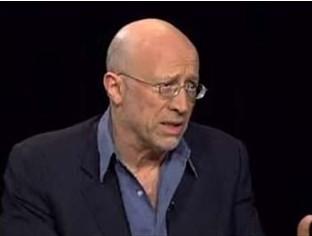訃告;托尼·朱蒂;
Tony Judt, historian and intellectual, died on August 6th, aged 62;
歷史學家、學者,托尼朱蒂于8月6日過世,享年62歲;
Quizical, erudite and clear-sighted, Tony Judt never let matters rest. He worried at his own beliefs—Zionist, Francophile, socialist and Euro-federalist—until they fell apart and reformed under the pressure of his restless, meticulous intellect. Few people in the Anglo-Saxon world can call themselves “intellectuals”, continental-style, without feeling (and sounding) a little odd. But in Mr Judt's case the word deserved a capital “I”.

明智、好學,時刻秉承著探索精神,托尼朱蒂從來沒有停止過探索的步伐。他曾一度擔心自己的信仰-支持猶太主義、親信法國以及歐洲聯邦主義-直到這些信仰在他那無休止的、謹慎細微的學術精神的促使下,很好地分離并重組起來,他才不再擔心。很少有人能在盎格魯-撒克遜的世界里大膽地自稱“學者”,而不感到名不副實,但到了朱蒂先生這里,沒有人再比“我”更合適了。
In the world of brain and pen, his main trade was as a historian: he plunged into that at Cambridge in the 1960s, and stayed with it even when immobilised by the wasting disease that cost him his life. His was no narrow historicism: he scorned the idea that the past was a guide to the future. But study of it could help avoid making the same mistakes twice.
在智慧與筆尖的世界里,成為一個歷史學家成為朱蒂先生的主要人生軌跡:他于19世紀60年代考進劍橋大學便開始從事這個行業,直到那最終奪走自己生命的惡疾讓他無法動彈,他都從未離開過歷史學。他所研究的并非狹隘的歷史主義:他蔑視那些認為歷史可以引領未來的觀念。但他認為學習歷史可以避免在同一個地方跌倒兩次。
Though he worked in America from 1987, his intellectual centre of gravity was Europe; the defining event in his world view was the second world war, and Hitler's Holocaust. The aftermath of those catastrophes was the theme of “Postwar” (2005), a 1,000-page tome that dealt with the 44 years between the end of the main fighting and the collapse of the Soviet totalitarian empire that survived it. It was a book more bought than read. But even skimmers got the message: the European Union was a vitally important experiment, an attempt to transcend the ideological, nationalist and ethnic schisms that had cursed the continent. Prosperity, modernisation and peace, plus a judicious dose of amnesia, would lay the ghosts to rest.
雖然朱蒂先生從1987年開始在美國工作,但他的學術中心依舊落在了歐洲;在他的世界觀里,第二次世界大戰以及希特勒的恐怖主義才算是大事件。這一系列的災難所造成的后果便形成了一本主題為“戰后歐洲史”(2005年出版)的書,這本長達1000頁的巨著闡述了從主要戰爭的結束到蘇維埃集權主義倒塌的這44年。大多數購買此書的人都沒有讀過。但只要是粗略讀過此書的人都能得到這樣的信息:歐盟曾是一個相當重要的實驗,這個實驗企圖超越那些咒罵社會的理想民族主義者和民族分裂者。朱蒂先生認為繁榮,現代化以及和平,再加上少許明斷的淡忘,這些便能安頓魔鬼,而更何況民眾呢。
But Mr Judt was no sentimental Europhile. His deep connections with the Czechoslovak opposition under communism gave him rare binocular vision, and an edginess towards those who focused only on the luckier western half of the continent. He detested the shallowness and artificial obscurity of European-born intellectual fashions such as post-modernism and structuralism. In politics, he bemoaned what he saw as the degeneration of the EU into a racket run by an elite class of administrators for the benefit of its richest citizens. Admittedly, the Eurocracy's enlightened despotism was better than the other kind. But the cult of efficiency was no substitute for democracy and justice.
但是朱蒂先生并非一個感性的親歐盟主義者。他深入地關注斯洛伐克人在共產主義下的反抗行為,這一點使得他能細微地、犀利地洞察那些只關心那些幸運的富饒西方大陸的人。他討厭那些淺薄的,諸如前現代化、建筑學等晦澀的歐洲土生土長的學術潮流。在政治方面,朱蒂先生認為歐盟已經墮落成一個由高層精英所操控的非法局面,而這些非法勾當全是為了那些最富有的公民的。他承認,歐洲開明的統治者比起其他的好很多。然而,但是民主和公平是不能用對效率的追求來代替的。
Mr Judt's deepest knowledge was of France, and particularly its post-war intellectual history, which he regarded with a mixture of fascination and disgust. “Past Imperfect”, published in 1992, was the definitive book about the self-indulgence and wilful self-delusion of the French brainboxes who failed to see that Stalin was a monster.
朱蒂先生最深遠的研究莫過于對法國的歷史的學習,尤其是第二次世界大戰之前的法國學術歷史,他認為這段歷史正是法國美好與丑惡并存的時期。一本名為“過去的瑕疵”的書在1992年出版,該書的最終版本正是關于那些法國統治者沉溺在對自我的放縱和自我的妄想中,并沒有察覺到斯大林是個惡魔。
His evisceration of the phoney and creepy was best displayed in his journalism, often in his natural home of the New York Review of Books. A savage collection of essays, “Reappraisals”, published in 2008, skewered among others Louis Althusser, a mad Marxist wife-killer with a cult philosophical following, and Eric Hobsbawm, a distinguished British historian with unrepentant pro-Soviet views. George Bush fared little better: Mr Judt was a trenchant critic of his policies in Iraq and the Middle East.
朱蒂先生對虛假和駭人聽聞的事情的反駁的文章常常出現在他的報刊中,但更加經常出現在他那個名為“紐約書評”的簡單文集中,“重新評價”于2008年出版,在同類雜志中獨樹一幟,文中講述了路易斯盧梭,一個瘋狂的馬克思主義者,對哲學有著瘋狂的崇拜,殺死了自己的妻子,~~,一個獨一無二的英國歷史學家,卻懷揣著不可悔改的前蘇聯觀念。就連喬治布什總統都未得到另眼相待,朱蒂先生曾對他的伊拉克于中的哦個政策提出了嚴厲批評。
In hot water
水深火熱
He was fearless in his fights. When he found the pro-Israel lobby in America too strong, and thought Israel's democratic credentials were weakening, he said so. That got him into the hottest water of his career. It started with an essay in the NYRB in 2003 stating that the peace process was “finished”; that the Jewish state was an “anachronism”; and that legitimate criticism of Israel was being silenced by bogus charges of anti-Semitism.
他從未畏懼戰斗。當他發現在美國的前以色列團體活動過于激烈時,他意識到以色列的民主信任度正在下降,并且也這樣發表了自己的意見這一點使得他陷入水深火熱當中。這一切源自他在2003年NYRB雜志上發表的一篇文章,文中宣稱,和平的過程已經“結束”;猶太人建立自己的國家只是個“時代的錯誤”;并且對以色列合法批判聲音被反猶太主義的謠言所淹沒了。
Nobody could accuse him of letting fly from a position of ignorance. He had been an ardent teenage Zionist, working as an interpreter during the six-day war of 1967. But to many his critique was exaggerated. Given the intense publicity he attracted, it was hard to argue, as he did, that debate was habitually squelched. The notion that Israel had no friends outside America, or could be “the” (his italics) threat to world peace, struck even some of his friends as extreme. Lectures were cancelled and the New Republic, a longstanding ally, removed him from its masthead.
沒有人能夠抓到他懈怠的把柄,朱蒂先生曾經是一個熱情而年輕的猶太主義者,曾在1967年的六日之戰中擔任翻譯員的職務。但是對大多數人來說過于激進,當遇上令他著迷的緊張政治事件時,個人的觀點往往很難得到承認,正如他做的那樣,他的辯駁被很自然地掩埋了。他的一些關于以色列除美國外沒有朋友或以色列對世界和平會造成什么威脅的觀點,都極大地震撼了他的身邊的朋友們。他的課程被刪除,”新出版”——一個長期的合作伙伴也將他的名字從報頭刪除。
A severe self-critic, he dealt poorly with sniping from others. This East End boy did not wear his learning, or his polyglottal talents, lightly. He tended to dismiss adversaries as fools, rather than as merely mistaken, or half-right. As the head of a richly endowed faculty at New York University, his contempt for the poverty of British universities could sound gratingly complacent. He could fund-raise. So should they.
他對別人的惡意中傷卻嗤之以鼻,卻是一位嚴厲的自我批評者。這位來自東部邊上的男孩從來不輕易炫耀他的學識與多才多藝的天賦,他寧愿將自己的對手看成是一個個的傻子也不愿意將他們當成只是有一點點的學術過失或對學術方面是一知半解的人。作為紐約大學大額捐資教員中的領頭人,他對英國大學普遍財政窘迫的輕蔑聽起來可能成了刺耳的沾沾自喜。認為既然自己可以籌集資金,他們也應該可以。
His final ordeal might have inspired great self-pity, though he displayed no hint of it. Just under a year ago, he appeared at a public lecture in a wheelchair to announce that he was suffering from a variant of motor-neurone disease, in which the body succumbs to inexorable paralysis: like being imprisoned in a shrinking cell, he said. But he wrote about that too, in poignant, crystalline vignettes about his upbringing and travels.
雖然朱蒂先生從未提及,但是臨終前的病痛肯定引起他的極大自哀,就在一年前,他出現在公共演講庭,坐在輪椅上告訴別人,自己現如今正被不同種類的動態神經細胞病變所折磨,這是一種將身體蹂躪成麻痹狀態的病:感覺像困獸般被囚禁在一個不斷縮小的牢籠中,他坦言到。但他也同樣這樣寫過這些,就寫在那些關于教訓和人生旅行的辛酸和水晶般的小拼圖中。
He was “raised on words” though by the end his vocal muscle, “for 60 years my reliable alter ego” failed him: “vowel sounds and sibilant consonants slide out of my mouth, shapeless and inchoate”. He minded that, while insisting that “the view from inside is as rich as ever”.
盡管他臨終時坦言“這60年中我不斷懷疑自我“.他卻是“立足于學術信仰”,接著便是一段嗚咽,然后他接著說“從我嘴里說出來的元音和輔音發出吱吱的聲響,他們都那么得無形而且沒有回音“。他沉默了一會,然后堅定地說到”只有源自心靈深處的聲音才會永恒“












